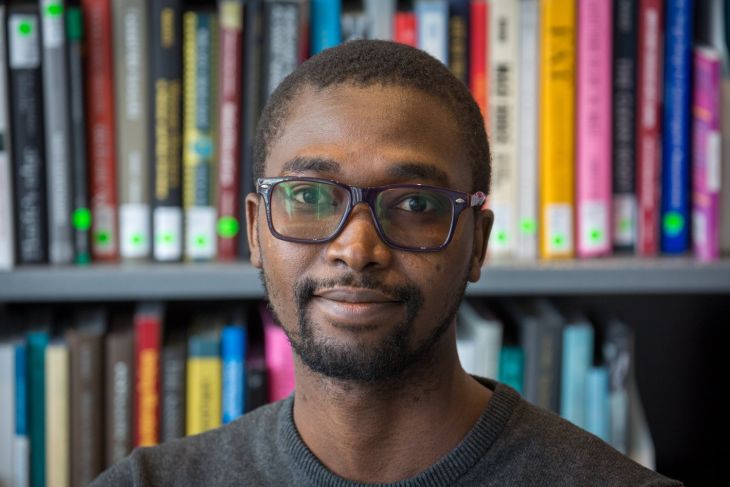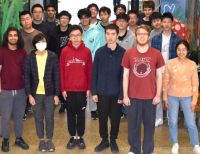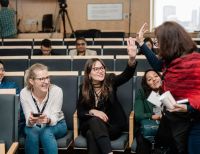As a child growing up in northern Nigeria, Abdullahi Tsanni always knew he had a passion for writing. Some of his earliest memories are trying to read his mother’s writings in Arabic and Hausa. It was in secondary school when Tsanni also developed an interest in science.
When Tsanni was studying biochemistry at Ahmadu Bello University in Nigeria, a path toward science journalism began to take shape.
“I would randomly write articles about some of the topics being taught in class: proteins, amino acids, nucleic acids,” he recalls. “I would use my pocket money to print the articles I wrote, and then I would go around and paste them up on the boards in the department and share in the class.”
Now at MIT, Tsanni, 28, is a student in the Graduate Program in Science Writing (GPSW). Tsanni’s journalism focuses on science, medicine, and public health research in Africa.
“Science is too important to leave only to scientists, so we need to really communicate that to the wider public,” he says. “That is what the Graduate Program in Science Writing at MIT is helping me to do: to understand how to interpret and explain science to the wider public using a broad range of media.”
His goal is to broaden understanding and expand coverage of science research in Africa.
“Science has the potential to solve a lot of the problems we currently face: food insecurity, climate change, and disease outbreaks. But many people in Africa don’t understand why science matters,” says Tsanni. “I really want to bridge that gap and bring broad scientific literacy to my reporting on issues of science and public health and really encourage a scientific habit of the mind.”
Tsanni’s work has been published in Nature, Popular Science, African Newspage, Nigeria Health Watch, and other outlets. In January, Tsanni wrote an article for the British Medical Journal that examined visa discrimination against African public health professionals invited to participate in global health conferences. Tsanni says the investigative journalism classes he took through GPSW last fall helped him find sources and fact-check to ensure his reporting was accurate.
Tsanni hasn’t been afraid to address sensitive issues with his journalism. An article he wrote for Nature last year profiled Nadia Sam-Agudu, a pediatric scientist who shared her story of the type of racism African scientists often experience when working globally.
“It’s a very important issue,” says Tsanni. “A lot of people feel uncomfortable talking about it, but they experience it. I was glad she trusted me with that story.”
Tsanni’s article in Nature was edited by MIT Chancellor Melissa Nobles, who was serving as a guest editor on a special issue exploring matters of racism and science. Tsanni says Nobles guided him through the conceptualization and structure of the article.
Tsanni is a founding member of the nonprofit African Science Literacy Network, a partnership that brings African scientists and journalists together with the goal of developing accurate science communication with policymakers and the public.
“The problem is in the media in Nigeria, very few journalists have a science background or science journalism training, so they shy away from reporting science. We wanted to change that, and we thought one way to do it is to recruit scientists and journalists and to train them in science communication and help develop their skills to communicate science effectively.”
After earning his undergraduate degree in biochemistry from Ahmadu Bello University, Tsanni didn’t have access to formal training in science journalism, so he relied on intensive self-teaching, reading science stories and using any feedback he received from editors. In 2021, he was named an Early-Career Science Journalism Fellow at The Open Notebook. The fellowship lasted eight months, where Tsanni received mentorship from science journalists Siri Carpenter and Chrissie Giles.
Tsanni says he’s grown as a writer, but “I’m still just beginning. I’m learning a lot at MIT. The Graduate Program in Science Writing has really helped me to refine my skills. It’s helping me to better understand how to structure stories, how to find sources, and how to interview. Most importantly, I’m learning to use other media like documentary filmmaking.”
Tsanni is taking a science documentary class, where he’s working with Comparative Media Studies/Writing professor Thomas Levenson to produce a film that explores the lives of Black engineers at MIT. He says they hope to shine a light on the experiences and long history of Black engineers at the Institute.
Students in MIT’s GPSW are required to develop a thesis as part of the year-long program. Tsanni is focusing his thesis on examining the barriers blocking efforts to eradicate tuberculosis and to bring innovative treatments and diagnostics to the point of care in developing countries and Africa. In February, Tsanni traveled to Los Angeles and spent time with leading TB researchers at the University of California at Los Angeles trying to understand why the disease is scientifically so difficult to eradicate.
“I visited a vast, hauntingly beautiful cemetery, where I located the graves of people who died from TB in the U.S. more than 100 years ago,” he says. “I want to make the connection between the American experience of TB and the African one today.” While the United States was able to launch massive public health campaigns to educate about TB prevention and treatment, Tsanni says the disease remains a ferocious killer in other parts of the world, “disproportionately affecting people in Africa and developing countries.”
After graduating, Tsanni plans to continue working as an independent science journalist, publishing stories about Nigerian and African science. He plans to return to Nigeria to pursue a management and leadership role in the African Science Literacy Network, with a focus on human capacity-building across Africa’s science and media sectors.
“Long term, I would like to establish a science publication that covers science and global public health issues in Africa,” he says.







